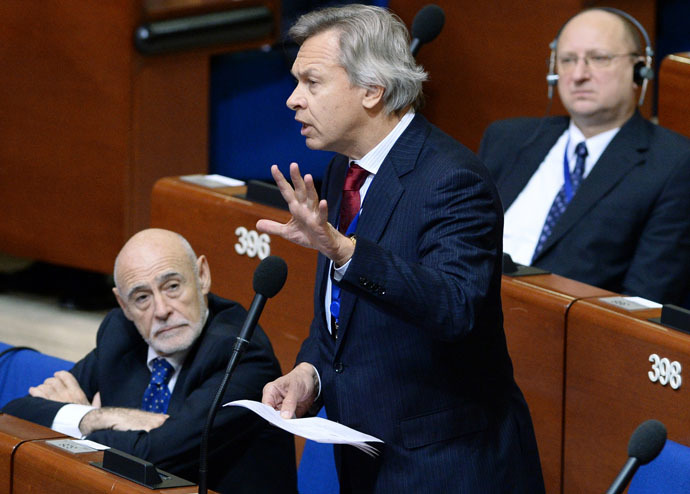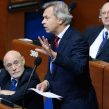
Russia Makes Haste in Severing Ties With Europe
Publication: Eurasia Daily Monitor Volume: 12 Issue: 20
By:

Russia has achieved much success last week in its rush toward self-isolation, and perhaps the most demonstrative step was made in the Parliamentary Assembly of the Council of Europe (PACE). Sergei Naryshkin, the Chairman of the State Duma, came to Strasbourg as the head of the Russian delegation expecting to reach a compromise on the issue of restoring Russia’s full participation in this important pan-European forum. But he was so irked by the international body’s decision to prolong its sanctions against Russia (including the suspension of the right to vote) for another three months that he stormed out of the Palace of Europe and announced that his country would abstain from partaking in the PACE proceedings until the end of 2015 (Ezhednevny Zhurnal, January 30).
Some outraged Russian parliamentarians predictably railed against the “discredited bureaucracy” of the Council of Europe, even if the only other precedent, to date, of such a unilateral abstention from participating in PACE was set by the Greek military junta in 1969 (Nezavisimaya Gazeta, January 29). Other zealous legislators even suggested Russia should now restore capital punishment, which was legally abolished in 1996 to meet the conditions for joining the Council of Europe in the first place (Rossiiskaya Gazeta, January 29). Meanwhile, the PACE commission was denied access to Nadezhda Savchenko, a Ukrainian pilot who was captured near Luhansk in June 2014, and has been held behind bars in Moscow as a hostage in the bargaining with the Europeans (Grani.ru, January 29).
The Council of Europe and PACE are important in the area of democratic freedoms and human rights, but far more important for the presently quasi-democratic Russia are its relations with the European Union; and here, again, last week witnessed a new low. Moscow was particularly enthusiastic about the parliamentary elections in EU-member Greece (January 25), expecting that the government formed by the victorious far-left SYRIZA party would be “Russia-friendly” and initiate reductions in the EU sanctions regime (Nezavisimaya Gazeta, January 30). New Prime Minister Alexis Tsipras has indeed welcomed financial support from Russia, but when it came to real policymaking in Brussels, Greece agreed to extending the current sanctions (Kommersant, January 30). There is a strong multilateral lobby in the EU for exploring grounds for compromises with Russia, but the shelling of Mariupil last week threw that conciliatory sentiment into disarray (Novaya gazeta, January 30).
Russian authorities have stopped entertaining ideas about responding to EU sanctions with counter-sanctions, but they are keen to demonstrate resolution to respond to any “hostile” actions from the North Atlantic Treaty Organization (NATO), which used to be an important partner but is now painted even darker than Soviet propaganda ever managed to do. Secretary General Jens Stoltenberg dismissed as “nonsense” President Vladimir Putin’s statement that a “NATO legion” is waging war in eastern Ukraine, seeking to deter Russia (RBC.ru, January 26). This nonsense is nevertheless a key element of the Russian discourse that interprets the Ukraine crisis as the central battlefield in the confrontation between a defiant Russia and the inherently aggressive West (Gazeta.ru, January 30). This discourse is translated into strategic plans for building up the groupings of armed forces in Crimea, in the Kaliningrad exclave and in the Arctic (Vzglyad, January 30). In order to prove the urgency of such plans, provocations—like the “patrols” of two Tu-95MS strategic bombers over the English Channel last week (January 28)—are staged increasingly often (Newsru.com, January 30).
The costs of these military exertions and exhibitions are prohibitively high for the degenerating Russian economy, but even more damaging is the impact of this brinksmanship on Russia’s economic ties with Europe. The government has finally recognized the need to develop an anti-crisis plan (without admitting the facts of the crisis). Nonetheless, the bureaucratic battles go about distributing the dwindling financial reserves, while no agency dares to advance a reform proposal (Forbes.ru, January 29). Putin’s subordinates who run leviathan-corporations like Rosneft or Russian Railways have a vested interest in erasing every timid suggestion for economic liberalization; but oligarchs of independent means, like Mikhail Fridman, argue that the end of the era of over-priced oil could actually be good for Russia because political systems based on rent distribution are demoralizing for the people (Vedomosti, January 30). Such demoralization is becoming more apparent as the statistical decline of real incomes affects the quality of life of the urban middle classes (RBC Daily, January 29). The Kremlin propaganda is working hard on directing the growing discontent toward external enemies. And as a result, the fabric of human ties to Europe is becoming damaged by the “patriotic” fever (Novaya Gazeta, January 27).
Russia has indeed become obsessed with the violent drama in Ukraine to such a degree that Putin can only sustain his dubious approval ratings by acting as a war leader (Snob.ru, January 31). German Chancellor Angela Merkel and French President Francois Hollande keep trying to engage him in a conflict-management conversation, but for Putin, the only point in these exchanges is to keep his counterparts guessing about his next move (Kremlin.ru, January 26, 31). US Secretary of State John Kerry considered the option of coming to Moscow, but the escalation of rebel attacks toward Mariupil and Debaltsevo proved that talking would be a waste of time—and the visit was cancelled (Kommersant, January 31). Quite possibly, the Russian head of state still hopes that Western unity will crack under pressure. However, each one of his forceful demarches depletes the ranks of compromise-seekers in the West.
Every next step in breaking contacts and communication with Europe comes easier for Russia as the war becomes the dominant influence shaping domestic politics, and the demand for destabilization grows in a society poisoned by the vicious propaganda and traumatized by the fast-unfolding economic disaster (Slon.ru, January 30). Putin tries to go slowly in satisfying this demand because his court and the vast bureaucracy underpinning it have huge material stakes in keeping the corrupt system going. But he also needs to stimulate society’s urge for new victories, which secures his control over the deepening domestic discontent. There is, therefore, no fixed ceasefire line on which he can stop. Consequently, there is no chance for Western leaders to sit with him and divide the region up into mutually acceptable—if morally reprehensible—zones of control, as was done in Yalta 70 years ago.




